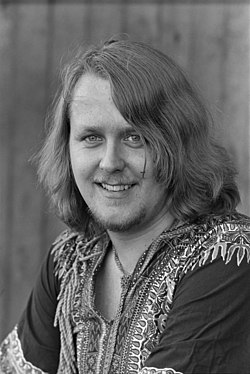Hector | |
|---|---|
 Hector in 1970 | |
| Background information | |
| Birth name | Heikki Veikko Harma |
| Born | 20 April 1947 Helsinki, Finland |
| Origin | Helsinki, Finland |
| Genres | Suomirock, folk rock |
| Occupation(s) | singer, songwriter |
| Instrument | guitar |
| Years active | 1965–present |
Heikki Veikko Harma (born 20 April 1947) is a Finnish singer-songwriter who has also distinguished himself as a translator of song lyrics, but has written popular lyrics of his own too. To the public he is better known by the name Hector, which he has used since the release of his 1965 debut single "Palkkasoturi", a Finnish translation of Buffy Sainte-Marie's "Universal Soldier". His 1974 album Hectorock I became the fastest-selling record in Finnish history, selling 50,000 units within a few months. [1] Hector was at the height of his popularity in the first half of the 1970s, but his steady string of recordings provided occasional hits well into the 1990s. In the 2000s he made a strong return to popularity with Ei selityksiä, which became one of his most successful albums. In 2007 he made a farewell tour on big arenas, but has performed occasionally after that too. In 2011 he made a massive comeback tour and released a new album Hauras (Fragile) in 2014, ten years after his previous album.
Contents
Hector's work is very diverse in its musical styles. He is mainly known for his folk rock songs, but he has also made progressive rock, hard rock and heavy metal songs. He has translated into Finnish works by Don McLean, Procol Harum, King Crimson, Neil Young, David Bowie and several other artists. Today he is considered, due to his extremely long and distinguished career, as first a pioneer and later a mainstay of Suomirock. His lyrics have often a political and/or social component.
Some of Hector's songs are considered classics of Finnish popular music, such as "Lumi teki enkelin eteiseen" (Snow made an angel in the lobby), "Mandoliinimies" (Mandolin man) and "Olen hautausmaa" (I am a graveyard), and he can be considered a primary contributor to Finnish rock music of the 1970s. He has also written song lyrics for other Finnish singers. His song "Juodaan Viinaa" (Let's drink spirits) was covered by Finnish folk metal band Korpiklaani on their 2009 album Karkelo. [2] [ non-primary source needed ] Hector is the Finnish voice actor of The Muskrat in the Finnish-British animated television family drama Moominvalley (2019–). [3]
In addition to his music career, Heikki Harma has also worked as a music journalist on radio.